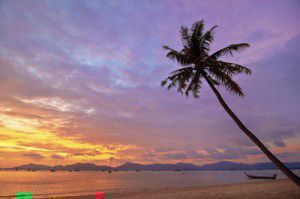Breaking down barriers with The Broke Backpacker
Meet Will. He’s the writer and adventurer behind travel blog The Broke Backpacker, and he just embarked on an epic two-year journey from home in the UK to Papua New Guinea.
The twist? He’s not taking any flights. Oh, and he’s travelling on a daily budget of $30.
Will’s been on the road already for two weeks, and is currently making his way through Europe. Over the next two years he’ll be visiting 30 countries, including Turkey, Pakistan, Myanmar, Tibet, and Indonesia, and sharing his adventures along the way.
Why are we telling you this?
Well. When we heard what he was planning, we figured Will might find himself in need of an app that includes over 120 languages from all across the world, which would enable him to talk to people wherever he goes.
Fortunately, it just so happens we have an app like that. So we’re very excited to announce that uTalk is the official language sponsor of Will’s adventure, and he’ll be using the app on the road to learn and speak everything from German to Tajiki, Albanian to Khmer. He’ll even be able to greet people in Tok Pisin on his arrival in PNG.
Will’s been travelling for seven years, and knows how important it is to speak a bit of the local language: “Learning a new language is hands down the best way to make new friends and peek behind the curtain. uTalk helps me to break down barriers, learn the local lingo and make friends in the most unexpected of places.”
We can’t wait to follow Will as he makes his way across the world, visiting some fascinating countries and meeting loads of interesting people. And we’re looking forward to hearing him speak all the languages 😉
You can follow Will’s adventures on Twitter or Facebook, or for more instant updates, on Snapchat (@wthatton).
Introduction to: Tok Pisin
Halo! Nem blo mi em Nat. Gutpela lo meetim yu!
Or, in English: Hello! My name’s Nat. Nice to meet you!
Today we’re having a short introduction to Tok Pisin (literally, ‘Talk Pidgin’), one of the three official languages of Papua New Guinea (along with English and Hiri Motu).
We recently recorded Tok Pisin for our uTalk app (coming in the next update), with our delightful voice artists Rhonda and Patrick, and I was intrigued by how the language works. Tok Pisin grew up out of a country teeming with hundreds of other languages – even today, there are still over 800 languages spoken in PNG. Tok Pisin developed as the lingua franca, a common tongue everyone could use for trade and communication. Nowadays, it is a language of instruction in schools and the mother tongue of over a million people, with millions more speaking it as a second language.
Beyond a doubt, Tok Pisin is a complex language with plenty of grammar rules to learn, but I am reliably informed that after a few weeks of immersion you would start to pick up the basics, and even during our recording session I was recognising some logical constructions in the language. For example, we have:
hausik (house sick – hospital)
haus moni (house money – bank)
haus krai (house cry – mourning house)
haus kaikai (house eating – restaurant)
Once you pick up a few basic elements, it all seems to make a little bit more sense:
Wara is ‘water’, so you can see how solwara (‘salt water’) means ‘sea’.
Liklik is ‘small’, so you can see that liklik prais (‘little price’) is ‘cheap’.
Liklik maunten (‘little mountain’) is a ‘hill’.
And:
Ples blong means ‘the place of’, so ples blong waswas is a bathroom.
Ples blong silip is somewhere you sleep.
Ples blong kaikai is a dining room, or somewhere you eat.
My favourite construction is the suffix –pela (apparently from the English ‘fellow’), which modifies nouns and adjectives. So although wan is simply ‘one’, if you’re qualifying a noun then it becomes wanpela: ‘one doctor’ is wanpela dokta. Similarly ‘big’ is bikpela, ‘this’ is dispela, ‘good’ is gutpela, ‘we’ is mipela, ‘you’ is yupela, strong is strongpela.
Knowing all this, can you work out what this sentence means? Tell us your suggestions in the comments, and we’ll reveal the answer tomorrow…
Dispela wara ino gutpela blong drink.
If you’re finding that you’re as captivated as I was, and you’d like to learn a bit more, get one of our Tok Pisin products and start learning!
Nat
(Answer: This water is not safe to drink.)



